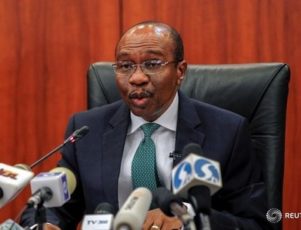LONDON (Reuters) – European shares hit a four-month low on Thursday as banks dropped sharply, while oil prices headed for a sixth session of losses after the Bank of Japan refrained from further stimulus and the U.S. central bank struck a cautious note.
U.S. stock index futures were down around 0.4 percent, indicating a lower Wall Street open.
Sterling hit a two-month low against the euro, underscoring worries that Britain, the world’s fifth-largest economy, will vote to quit the European Union on June 23.
According to an Ipsos MORI survey, British support for Brexit hit 53 percent, the highest for the “Leave” campaign recorded by the pollster in more than three years.
A vote to end Britain’s 43-year-old EU membership would spook investors, undermining decades of European integration and placing a question mark over the future of the United Kingdom and its $2.9 trillion economy.
Concerns over Brexit, in combination with dimmed expectations on global growth, have driven investors towards safe-haven assets such as German bunds and gold, and out of oil and stocks.
Euro zone banking stocks dipped to near four-year lows, with Deutsche Bank, down 2.8 percent, and Credit Suisse touching record lows.
“The global economic and political outlook is dark,” said Chirantan Barua, an analyst with Bernstein. “Brexit is fuelling uncertainty and will have ripple effects across Europe. With so much uncertainty, why would you buy a bank stock now?”
Brent crude prices, which last week hit their highest this year, have fallen every day since June 8, dropping more than 8 percent in all.
Germany’s 10-year bond yield fell to a record low as fading expectations of U.S. rate hikes this year provided further fuel to a global bond market rally.
Spot gold climbed 1.4 percent, close to a two-year high.
Earlier in the day Asian markets were firmly in “risk-off” mode, with the yen surging to a 20-month high against the dollar and the Nikkei down more than 3 percent. Hong Kong’s Hang Seng index fell 2 percent.
Benchmark equity indices across Europe followed suit with Italy’s FTSE MIB down 1.6 percent. The pan-European FTSEurofirst 300 fell 0.7 percent.
Shares of UBS and Credit Suisse fell 1.3 percent and 2.8 percent respectively after the Swiss National bank said both banks were likely to need to raise an extra 10 billion Swiss francs to meet new leverage requirements.
(By Vikram Subhedar Additional reporting by Atul Prakash in London and Aaron Sheldrick in Tokyo; Editing by Keith Weir and John Stonestreet)











